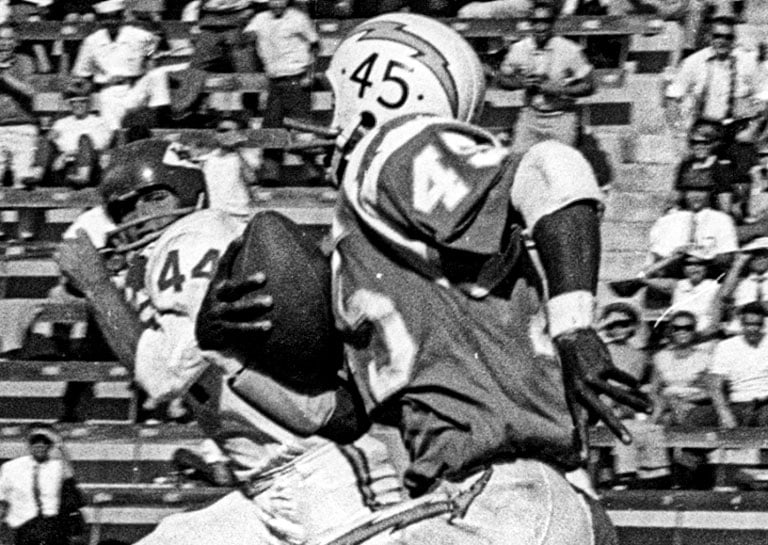The news of Chargers great Leslie “Speedy” Duncan’s death at age 79 came with sadness, appreciation and the recognition of two unlikely occurrences.
Duncan was on the only Chargers team to have training camp in Escondido. Not only was the North County graced with its presence in 1964 but it was a squad like none that came before or after it.
The Chargers were the 1963 American Football League champions. It remains the only summer the Chargers entered camp as a defending league champion.
Among their players was a cornerback and return specialist in Duncan, although his brush with fame almost never happened.
I covered many Chargers camps, but 1964 was even before my stint. But what a time I had meeting Duncan, while writing “Game of My Life San Diego Chargers.”
Duncan was living with his daughter in Spring Valley when I shook his hand. It was clear to see why they called him Speedy, even at his advanced age. He scurried this way to grab an old picture, he went that way to uncover a scrapbook with yellowed clippings and frayed edges.
Duncan’s eyes sparkled when explaining how he intercepted this pass or brought back a punt that deflated one more opponent.
What I also took from Duncan was his quest to outrun racism while being a Black athlete in the Deep South in the turbulent 1960s.
The shifty Duncan made defenders miss while also seeking the balance that comes with equality.
For Duncan, a member of the Chargers Hall of Fame, it was a breeze to sprint past those in uniform colors opposite of his. Not so getting past those stifling his American dream of just playing football like those with lighter skin.
My admiration for Duncan, a three-time All-AFL selection and later a Pro Bowler with Washington, was always keen. But after connecting with this human highlight film, my respect grew when learning of the hurdles he faced and how his determination never faltered.
His story had an impact and maybe by telling it again, it’ll continue to do so.
Duncan was a star in Tuscaloosa, Alabama, but he wasn’t yelling “Roll Tide” despite scoring 26 touchdowns as a senior in leading his squad to a 11-0 record.
Many locals knew him, too, from the Tuscaloosa Country Club, where he was among its most popular caddies.
But an opportunity for him to play football at the University of Alabama was a longer shot than a hole-in-one on a par 5.
“Shoot, when we went by and they were practicing, all they would let us do was maybe peek under the fence,’’ Duncan said. “I wasn’t going to be able to play there; no blacks did that back then. So I knew I was going to Jackson State.’’
Duncan thrived at the all-Black school in neighboring Mississippi. But his senior year was derailed by a leg injury that sidelined him for the final seven games and torpedoed his chances of being selected by the National Football League or the AFL.
“I got passed up in the draft,’’ he said.
Al LoCasale, then a Chargers scout, knew of the 5-foot-10, 180-pound Duncan’s skills and he invited the free agent to Escondido for a tryout. Chargers coaches were soon shaking their heads and stopwatches: Duncan clocked a team-best 4.4 in the 40-yard dash.
“The coaches said, ‘Run that again little fella because something ain’t right,’’’ Duncan said.
Time didn’t lie, or stand still, when Duncan’s legs were churning.
“I came here with 10 cents in my pocket and I would race anybody for a dime,’’ Duncan said. “I was trying to get the coaches’ attention.”
What they saw was a force on both sides of the ball. What they also recognized was that Duncan looked like few others.
“They had quotas for Black players and only kept so many,’’ he said. “But I told them, ‘I ain’t going nowhere and I don’t care what I have to do to make the club.’’
He did that, of course, while also moving the ball forward in race relations. Treating people right regardless of their skin color remains a work in progress today, because of what guys like Duncan did all those yesterdays ago.
That’s something to remember when Alabama plays for yet another title in the coming weeks and the streaking Chargers aim for their first league championship since 1963.
Black players now make up about 70% of NFL rosters. The checks they cash dwarf Duncan’s $12,000 contract, the one he signed in Escondido during that unlikely summer of 1964.
Rest in speed, Mr. Duncan. Your integrity and drive will outlive all your statistics, as they should.
Contact Jay Paris at [email protected] and follow him @jparis_sports



